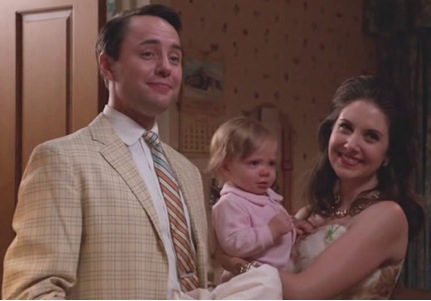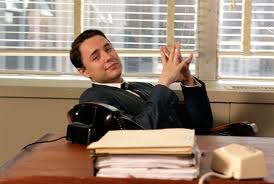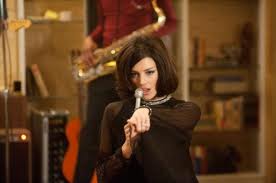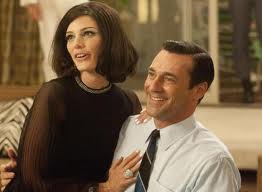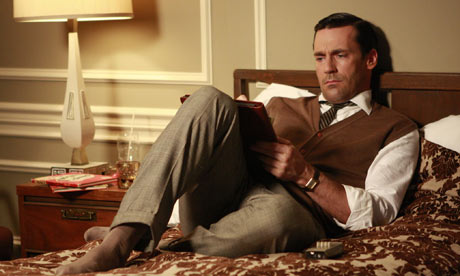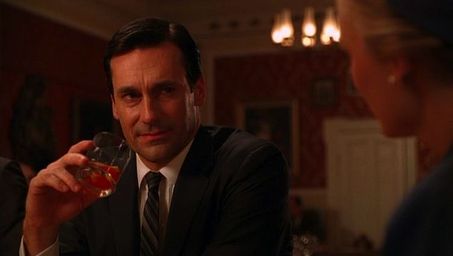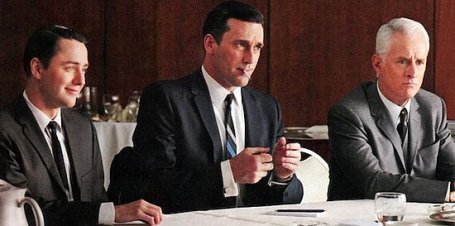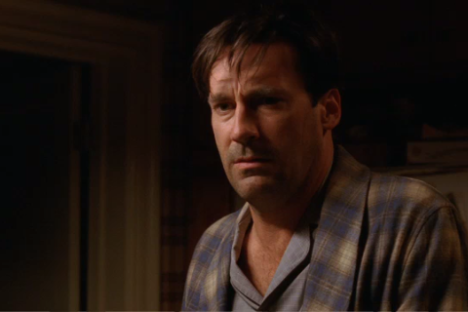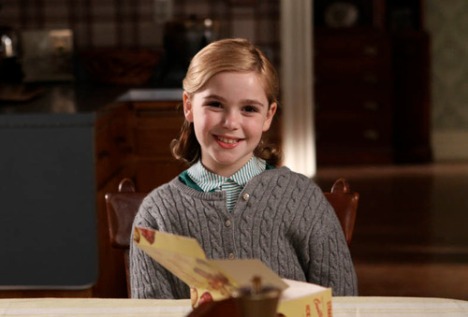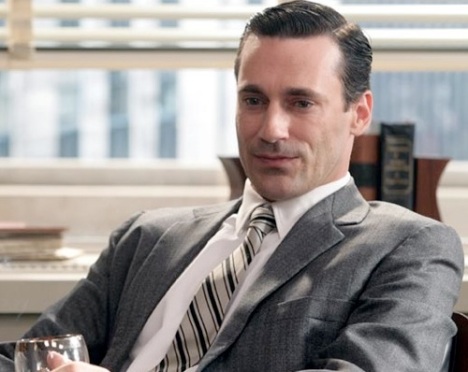
Near the end of last season’s final episode of Mad Men, Don Draper says to Peggy Olson, explaining how advertising ultimately operates as a complex confluence of nostalgia and wish fulfillment, and explaining why she should join him in his new firm, “Because there are people out there who buy things, people like you and me. And something happened, something terrible. And the way that they saw themselves is gone. And nobody understands that. But you do. And that’s very valuable.” In convincing Peggy to join him at Sterling Cooper Draper Pryce, Don makes clear that Peggy matters to him as a colleague. He values her ideas, her insight, her instincts. He recognizes her talent, her gift, a gift much like the one he himself possesses. Don wants Peggy to work for him and with him; he imagines a future in which they can do great things together. Finally, in this past week’s episode, Matthew Weiner began to play out the culmination of Don’s sales pitch to Peggy and finally took us further into their relationship than he has for quite some time.
During the current season, Don’s treatment of Peggy has not been everything she would like it to be. Although she clearly is one of the main creative minds at SCDP, she doesn’t always get either the respect or the accolades that she would like from her colleagues and from her boss. Although she was involved in the creation of the Glocoat advertisement that has won Don praise from the first episode of the season, he has not acknowledged her contribution, and went so far as to bring Joan to the Clio award ceremony instead of Peggy. She not only felt slammed by this snub, but took another blow when Don insisted that she work with the ever-frustrating (and often loathsome) Stan Rizzo.
Don tells her that she can learn some things from Stan, but Peggy has a hard time seeing how. Stan is lazy and yet a braggart. Moreover, he is something of a Neanderthal mixed with a countercultural wannabe, telling Peggy that she’s too rigid, stuffy, frigid even. It’s a great scene when she calls Stan on his bluffing and disrobes, forcing him to do the same. He can’t handle it and she reasserts her authority on the creative side. Objectively speaking, when looking at the firm, after Don, there’s Peggy and then there’s everybody else. No one else has the chops to match her, and she’s on the march forward and upward.
But here’s the problem – Peggy can’t seem to get Don to see her this way, as the one with talent, or at least to acknowledge publicly or even privately her talent and her work ethic. Instead he tends to berate her and belittle her. The pitch that she and her colleagues made for a Samsonite ad starring Joe Namath wasn’t bad, at least by today’s standards, but he called the use of an endorsement lazy. He repeatedly tells her that she’s not working hard enough and makes her work over the weekend or asks her to stay late at the office after everyone has left. She has disagreed with him before on some of his responses to her pitches, but until this episode, she never went back at him hard. In this episode, though, she started speaking to Don in a way that no one at the office really does. She was mad and she let him know it. She tells him she’s mad that he doesn’t show her respect or have gratitude for her hard work and that he makes her work with Stan. And she tells him that she resents that he has not acknowledged her contribution to the winning Glocoat commercial. She lets him have it.
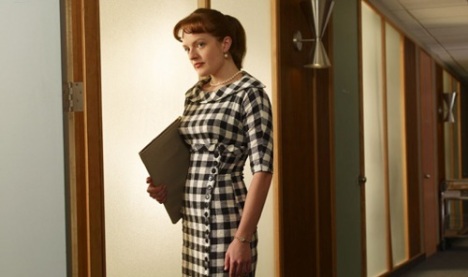
And it’s hard not to enjoy Peggy’s outburst as a viewer. Often, Don is treated like a guru, like a creative genius with the golden touch. In the first episode of the season, he was so sure of his vision that he kicked the people from Janzen out of the office and refused to have anything to do with them anymore. His approach, in that moment, was elevated to an ideology and he was the man in charge – giving interviews to the Wall Street Journal and serving as the face of the firm. But since that episode viewers have seen this myth of Don as the man with the golden touch as a mirage: his pitch of the Life cereal campaign was a failure that – according to the Life reps – went over the heads of their costumers and therefore failed at the most important level. His response – and yes, I recognize he was drunk – was pathetic. He became nothing more than a guy throwing out taglines without ideas, desperately trying to please the client. It was hard to watch, sure, but it was also comeuppance for how her treats others – clients and colleagues. Peggy, of course, was horrified. And angry. And that was before Don made her work all weekend with Stan Rizzo in a hotel room. When she went to his apartment on Sunday night to tell Don that he had made a mistake with the Life cereal, there was palpable joy on her face and in her voice when she told him that “HE had to fix it.” It’s rare that anyone gets to speak to him like that, and his hangdog look was something she relished, even if she’s shocked the next day when he hires Danny as a way to fix it and do penance for his behavior for the previous three days.
And that’s the part of the writing of Mad Men that is so enjoyable. Peggy doesn’t get exactly what she wants. Don isn’t flummoxed by what happens with Peggy. He doesn’t have to take back the line; instead, he just hires Danny and then the firm owns it. Plus, he gets in good with Roger by hiring his wife’s nimrod cousin. Peggy doesn’t yet know all the angles that Don does. She actually ISN’T as good as he is. Not yet anyway.
And he’s in charge, the creative director. Which he reminds her of when she complains to him this week about his lack of respect and gratitude and acknowledgement. When Peggy claims that the Glocoat commercial was her idea, he calls her contribution essentially a kernel. He eventually agrees that it was an essential part of it, but he doesn’t budge on the fact that she had an idea and he brought it to fruition and in the process improved it and made it successful. And that in doing so he was not only doing his job, he was being very good at his job. He clearly delineates the line between them. She works for him. When she says that she wants more respect and more appreciation, he says, as my wife reminded me, “That’s what the money’s for!” Don reinforces that the work that they do isn’t about receiving love, it’s about doing the work, being good at it, and finding satisfaction in both the process and the product. It’s where he’s happiest. It’s also where Peggy is happiest. Which is at least in part why she stays late that night and works all those other weekends.
Though Peggy might want to get some digs in at Don – and he deserves them for his behavior – she also wants his approval as her boss and her mentor. She wants him to see her as valuable, as good, as central to what they do at the firm. In the morning, after he gets the call that Anna Draper has died and as he sobs in front of her, she comforts him and she starts to see what has led to his boorishness over the last few weeks. The drinking, the sloppiness in the job, the desperation have been a product of Anna’s illness and impending death. He says that Anna was “the only one who knew who I really am” and Peggy dismisses that by patting his back and implying that no, she knows who Don is. Don is a product of his work: not an advertisement itself but a product of the process of the work. She knows this because that is what she is too. Earlier in the episode, she was aghast that Mark would invite her family to what was supposed to be an intimate birthday dinner for the two of them. “He doesn’t know me,” she says. The language here is exactly that which Don uses when Anna dies. To know Peggy, as to know Don, one must know what drives them. And to know that, you should know what they do and how they do it.
This is how Peggy and Don make their peace with one another – through the commonality of their purpose, through their work and ultimately through respect and trust. They are two of a kind, for each of them work and the imagination are central. They are “creative” – meant as both an adjective and a noun, as in the creative side of the firm. But being creative is hard work and it’s a process and you can’t shortchange it. It’s important to recognize that the symbol of their bond – their touching of hands – comes after Don shows Peggy his idea for the Samsonite ad and she agrees that it is good. The tone of the episode is deeply intimate; it’s not romantic in any particular way but the intensity of their connection is powerful and drives the dialogue and the action. The way that these two characters speak to each other is quite unlike the dialogue that anyone else has – they push and prod and give it to one another. They stand up to one another. She desperately wants his approval but she won’t just give in to his demands quietly. And he needs someone with whom he can parry and she’s ultimately the only one in the office who he sees as worthy of the interplay. He allows her to give him shit, even if and while he reminds her that he is her boss. And while they reveal elements of their personal lives to one another that they won’t show to others – he grew up on a farm, she is nervous about ever finding a mate, she has had a child that no one knows about, and he was arrested for drunk driving and she bailed him out – they trust one another enough to know that they can reveal these things to one another and yet these details do not have to be the things that define their relationship. They can know these things about one another and can move beyond them; their secrets, in other words, are not what defines each of them in the other’s eyes.

At the end of the episode, Don has cleaned up. He looks “fresh” – reborn, in a way, much like he was at the end of the second season when he walked into the Pacific Ocean in his clothes. And Peggy has seen him through. She stayed with him, supported him, brought him through the dark night of the soul. She too will freshen up and she will return and they will join together in their work. This is when they touch hands and acknowledge that they know each other. Again, at the end of the third season, Don asked Peggy to join him by telling her that “there are people out there who buy things, people like you and me. And something happened, something terrible. And the way that they saw themselves is gone. And nobody understands that. But you do. And that’s very valuable.” Peggy does understand. And of course Don does too. And it’s in their understanding of loss that they understand something deep, powerful, and intimate about one another. And it’s through their understanding of it that they will now move forward.
Filed under: Don Draper, Mad Men, Television | 1 Comment »


